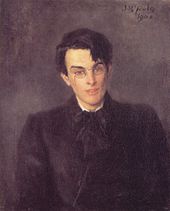Irish Literary Revival
[1] Others who contributed to the build-up of national consciousness during the 19th century included poet and writer George Sigerson; antiquarians and music collectors such as George Petrie, Robert Dwyer Joyce and Patrick Weston Joyce; editors such as Matthew Russell of the Irish Monthly; scholars such as John O'Donovan and Eugene O'Curry; and nationalists such as Charles Kickham and John O'Leary.Around the turn of the century Patrick S. Dinneen published editions of Geoffrey Keating's Foras Feasa ar Éirinn, poems by Aogán Ó Rathaille and Piaras Feiritéar, and other works for the Irish Texts Society and the Gaelic League.[9] On Easter Sunday 1900 Yeats' friend and muse, Maud Gonne, founded Inghinidhe na hÉireann (English: Daughters of Ireland), a revolutionary women's society which included writers Alice Furlong, Annie Egan, Ethna Carbery and Sinéad O'Flanagan (later wife of Éamon de Valera), and the actors Máire Quinn and Sara Allgood.In 1903 Yeats, Lady Gregory, George Russell ("AE"), Edward Martyn, and Synge founded the Irish National Theatre Society with funding from Annie Horniman; Fred Ryan was secretary.Yeats' brother Jack painted portraits of all the leading figures in the society for the foyer, while Sarah Purser designed stained glass for the same space.The Irish Review was founded in 1910 by Professor David Houston of the Royal College of Science for Ireland, with his friends poet Thomas MacDonagh, lecturer in English in University College Dublin, poet and writer James Stephens, with David Houston, Thomas MacDonagh, Padraic Colum and Mary Colum and Joseph Mary Plunkett.It was complemented by developments in the arts world, which included artists such as Sarah Purser, Grace Gifford, Estella Solomons and Beatrice Elvery,[13] and in music through works by composers such as Arnold Bax, Rutland Boughton, Edward Elgar, Cecil Gray and Peter Warlock, setting poetry and verse drama by Yeats, AE and Fiona Macleod.According to Matthew Buchan, Boughton's highly successful opera The Immortal Hour (1914), based on a verse drama by Macleod, "blends all the essential elements of Celtic Twilight".
a broader meaningW. B. YeatsEnglish colonial ruleGaelicIrish nationalismJames Clarence ManganSamuel FergusonStandish James O'GradyGeorge SigersonGeorge PetrieRobert Dwyer JoycePatrick Weston JoyceMatthew RussellIrish MonthlyJohn O'DonovanEugene O'CurryCharles KickhamJohn O'LearyGaelic UnionGaelic JournalDouglas HydeDavid ComynWilliam Butler YeatsT. W. RollestonCharles Gavan DuffyIrish Literary SocietyNational Literary SocietyArthur GriffithWilliam RooneyJohn Butler YeatsEugene O'GrowneyEoin MacNeillGaelic LeagueJohn Millington SyngeLady GregoryThomas A. FinlayNew Ireland ReviewEdward MartynIrish Literary TheatreGeorge MooreGaiety Theatretale of OisinAlice MilliganW. G. Fay's Irish National Dramatic CompanySeumas O'CuisinFred RyanPatrick S. DinneenGeoffrey KeatingAogán Ó RathaillePiaras FeiritéarIrish Texts SocietyMaud GonneInghinidhe na hÉireannAlice FurlongEthna CarberyÉamon de ValeraSara AllgoodTadhg Ó DonnchadhaGeorge Russell ("AE")Annie HornimanAbbey TheatreMáire Nic ShiubhlaighSarah PurserPadraic ColumGeorge Bernard ShawOliver St John GogartyF. R. HigginsThomas MacDonaghLord DunsanyT. C. MurrayJames CousinsLennox RobinsonJohn EglintonStephen GwynnJoseph Maunsel HoneGeorge RobertsJoseph CampbellKiltartanJames StephensMary ColumJoseph Mary PlunkettIrish VolunteersEaster RisingHome RuleGaelic Athletic AssociationDora Sigerson ShorterKatharine TynanSeán O'CaseySeamus O'SullivanGrace GiffordEstella SolomonsBeatrice ElveryArnold BaxRutland BoughtonEdward ElgarCecil GrayPeter WarlockFiona MacleodThe Immortal HourGaelic revivalThe Irish TimesThomas J. Morrissey, SJOxford UPWikisourceWayback MachineIrish poetryAislingDán DíreachMetrical DindshenchasIrish syllabic poetryKildare PoemsChief Ollam of IrelandIrish bardic poetryContention of the bardsWeaver PoetsAn GúmTáin Bó CúailngeMael Ísu Ua BrolcháinMuircheartach Ó CobhthaighGilla Mo Dutu Úa CaisideBaothghalach Mór Mac AodhagáinGiolla Brighde Mac Con MidheGofraidh Fionn Ó DálaighFlann mac LonáinDonnchadh Mór Ó DálaighLochlann Óg Ó Dálaigh